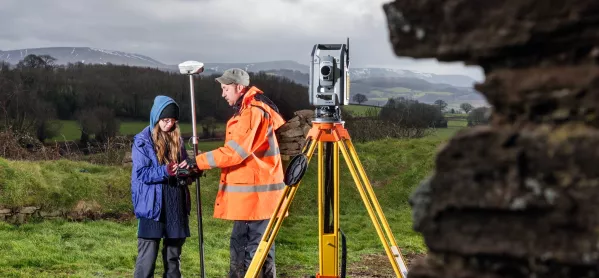
- Home
- Opening up the past with heritage apprenticeships
Opening up the past with heritage apprenticeships

In line with the government’s ambition that apprenticeships across a wide range of industries will help create the skilled workforce, employers need today and in years to come, as well as improving productivity, Historic England is seeking training providers to take advantage of commercial opportunities to deliver new apprenticeships
At Historic England, the public body that champion and protects England’s historic places, we are determined to seize the opportunity that apprenticeships offer.
Our ambition is twofold: first, we want to work with training providers and employers to attract a diverse new generation of young people to the full range of jobs in the heritage sector. It is a sector that is worth £29 billion to the national economy, but one that has, in recent years, struggled to appeal to new recruits to its 400,000 workforce.
Read more: Apprenticeship funding bands to be reviewed
More news: Apprenticeships: 400th new standard approved
Background: Tes launches #InspiringApprentices campaign
Second, we want to capitalise on the benefits apprenticeships can bring to our own workforce and use our work with apprentices as a model for others in the sector.
To our first aim. Recent reports have highlighted demand for skilled specialists and genuine skills shortages in the sector.
To design the apprenticeships the sector needs, the Historic Environment Trailblazer - a group of over 70 employers, training providers and professional bodies - has worked hard to develop new higher and advanced apprenticeships in archaeology, conservation and historic environment advice. They are all either just approved, or with approval expected this quarter.
Our challenge now is to support FE colleges and other training organisations to offer these apprenticeships, so that employers across the country are able to hire and train the new apprentices the sector needs.
Other qualifications phased out
The demise and phasing out of equivalent training pathways into heritage work: such as A-level archaeology, or the level 3 diploma in cultural heritage means there are significant heritage training gaps across the FE sector, with no training provider likely to have a training offer that maps directly onto the new apprenticeship standards.
Because of this, we plan to support the education sector to make sure that trainers can provide high-quality training that meets the requirements of the new apprenticeships standards. We are developing our sector-support training offer in order to support FE colleges and other training organisations keen to offer the new apprenticeships as part of their portfolio.
We hope there will be opportunities for a range of supply and partnership models that would allow us to support training delivery for the new standards, ensure that the quality of training is in keeping with our government advisory standards and promote association with our brand as a hallmark of heritage training quality.
The fact that the trailblazer group has been so successful in ensuring healthy funding bands (from £9,000 to £27,000, the money that is paid to training providers to cover training costs) should be a great incentive to training providers. Combined with the hard data on the labour market need the business case for training providers offering the new heritage apprenticeships could not be stronger.
Public sector apprenticeship target
As the standards are approved we are starting a conversation with training providers asking them to:
- Visit the standards section of the Institute for Apprenticeships and Technical Education website to review the standards in development.
- Map existing training content to the new standards and consider how they will best deliver training for the new apprenticeships.
- Build the new heritage apprenticeships into their business and curricular plans.
- Consider possible options for endpoint assessment, for example, working with existing independent assessment partners or contracting directly with one of the heritage sector’s professional bodies.
To our second ambition for apprenticeships: as a public sector employer, we have a duty to the government to reach a target of 2.3 per cent of our entire workforce being apprentices by 2020. But, beyond that duty, we see them as an incredible opportunity for the sector - and one that will benefit us an employer and enable us to lead by example.
While the new heritage standards have been under development, we have signed up over 20 apprentices at all levels in the organisation to a range of programmes in under two years, and are on track to meet our public sector employer targets.
A complex picture
The hard work and commitment of those team members have paved the way and opened doors to the many new apprentices we seek to appoint in coming months and years.
While the overhaul of apprenticeships does present challenges to the FE sector - it is a complex picture and planning ahead is difficult for colleges and training providers - in heritage they present a real opportunity to forge a new way into jobs that are both interesting and rewarding, in a sector that many young people many not initially recognise as an option for them.
Employers of all types, from large private companies in construction and infrastructure, to local authorities and national parks, and specialists in archaeology and conservation need skilled young people to take on these roles.
Michael McBratney is the heritage apprenticeships manager at Historic England. To find out more, email Historic England on HeritageApprenticeships@HistoricEngland.org.uk
Register with Tes and you can read five free articles every month, plus you'll have access to our range of award-winning newsletters.
Keep reading for just £4.90 per month
You've reached your limit of free articles this month. Subscribe for £4.90 per month for three months and get:
- Unlimited access to all Tes magazine content
- Exclusive subscriber-only stories
- Award-winning email newsletters
You've reached your limit of free articles this month. Subscribe for £4.90 per month for three months and get:
- Unlimited access to all Tes magazine content
- Exclusive subscriber-only stories
- Award-winning email newsletters